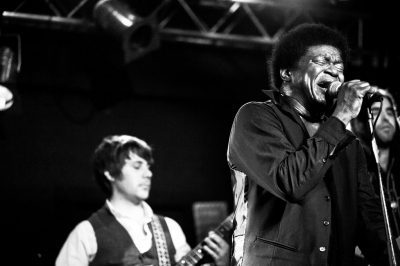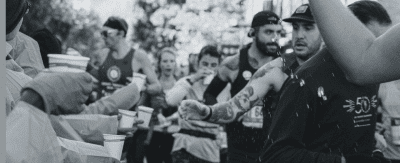Sarsgaard and Chastain in 'Memory' (The Match Factory)
Peter Sarsgaard on being the guy you’d ‘love to hang out with’
The actor discusses his new movie, ‘Memory,’ subverting traditional Hollywood love stories and Jessica Chastain
Peter Sarsgaard was not in a good place when he was about to start filming Michel Franco’s “Memory.” He had herniated a disc, was feeling unfit and at a low point mentally. But he would find comfort and inspiration from an unlikely place: his character Saul, who is suffering from early-onset dementia. Despite the merciless progression of the disease, Saul remains upbeat and takes life in his stride.
“Memory” tells the story of Sylvia [Chastain], a social worker and recovering alcoholic, whose life is changed when Saul [Sarsgaard] follows her home from their high school reunion. Both of their lives change as Saul forms a bond with Sylvia as she becomes his carer.
Brooklyn-based Sarsgaard has already received critical acclaim for his performance, winning the prestigious Volpi Cup for Best Actor at Venice Film Festival. And though the actor has never been nominated for an Academy Award, that could change with “Memory.”
This interview has been lightly edited for concision and clarity.
A lead character with early-onset dementia is not something I’ve seen in many movies, was this important to explore?
To me, the aspect of dementia was the obstacle that the character faces. The thing that he wants is connection and love so the dementia is the stick in the spokes that makes it difficult. I wanted to not only explore early-onset dementia, but it was important to me that it was the beginning of his journey with the disease.
What does the beginning of this journey look like?
Like a lot of people with dementia, there’s a couple of years that go by with people saying “What’s wrong with you? You forgot your keys again!” or “How did you get lost?” By the time you get diagnosed, you’ve probably been living with it for a while. My uncle had relatively early-onset because he had CTE from traumatic brain injuries from playing football and boxing. Dementia is a big container in which lots of things fit into.
Leading up to the role you did research with the New York group “Reimagining Dementia,” what was that like?
I worked with Dr. Peter Whitehouse and he put me in touch with some patients over the phone. There’s a tremendous amount that people can do and that’s an important thing to keep in mind. It is a progressive disease where the outlook is not great long-term but you can live your life right now. The day before you were diagnosed, you are pretty much the same person the day after. Reimagining it is just trying to explore what you can do.
You’ve said how you incorporate parts of your own life into each role you play, what did that look like with “Memory?”
When you do that it’s never “this part is me, this part is the character.” For most characters I play, when it’s going well, I feel like I’m not working hard and there’s a lot of me in there. I felt that way deeply with this role, largely because the temperament of the character is more similar to mine than some of the people who have reacted with violence that I’ve portrayed, or some of the careerists. Acting is a job with an asterisk next to it, it is a job but it’s not like showing up at the office every day. When I play someone with a real job then that always feels like something I have to work on.
Is it easier to do this in drama rather than comedy?
There is quite a bit of comedy in the movie. I’ve sat with audiences and they’re definitely laughing, it’s the laughter of recognition mostly. I don’t think there’s a massive difference between comedy and drama in terms of the kind I like to do. Typically, if you raise the stakes on something that doesn’t seemingly need to have its stakes raised, then a lot of comedy is achieved in that way. Just throwing a huge tantrum when you can’t find your keys and you discover they are in your hand. It’s not like the behavior isn’t real, it just doesn’t match the situation
Before taking the role you said you were in the “worst physical shape of your life” after you had herniated a disk. Michel Franco wanted you to stay in that shape when filming…
This guy has been sitting in his house, he could have been working out every day but I don’t think he is. I had actually just started to do some PT as I really injured my back. [Franco] said, “Stop it,” and I did. I’m actually just now starting to get back into the shape that I was in prior to the accident, so it took about two years. I would say now I feel 98 percent.
Do you think that there is a shift in traditional Hollywood love stories to reflect real people?
I hope so. I was thinking of some of the leading men from the ‘70s and I don’t want to point fingers… but let’s just say Elliot Gould didn’t exactly have a six-pack. We have so many leading men these days who are actors and have a lot of time and money on their hands who have trainers and coaches. People tend to react in an emotional way to stories that mirror their own lives. Most of my family and people in my life don’t look like the people in the movies.
As exercise is so important for mental health, what kind of headspace did that put you in?
I’m someone who really needs to exercise, not even for vanity’s sake but to relieve some anxiety. It is something that improves your mental health. When I went to do this movie I felt pretty low, but the character isn’t low. The guy who I’m playing is carpe diem all the way, the character actually gave me comfort to play. There are some characters I think, “I would love to hang out with that guy.”
Every Romance needs a great dance partner, what was it like to work alongside Jessica Chastain?
Jessica was very much in her own space with the movie. She was playing somebody who had gone through all of this trauma and didn’t trust other people. She didn’t do too much socializing on set, we typically only spoke to each other on camera which was pretty interesting, I’ve never done it to that extreme before. It wasn’t uncivil but it wasn’t acting camp.
Does that make it difficult to establish the dynamic of the romance?
It makes the romance be a certain thing. This is not a movie about an idealized romance, but it is a very moving portrait of what real connection looks like for many people. A lot of people don’t find their life partner, a lot of people find the person that they have a balance with: you lean this way and I lean this way and we seem to not fall down. I think that’s what these two characters establish with each other. It’s like the Jack Sprat rhyme, “Jack Sprat could eat no fat, His wife could eat no lean. And so between them both, you see, They licked the platter clean.” They provide things for each other that the other person doesn’t have.
Whenever I watch a movie filmed in the borough I get a grounded sense of realism.
For New Yorkers, if a film is shot in your city then it actually looks a lot less real. You think, “Wait, where are they? And they just walked there? That couldn’t happen.” The accuracy police creep in. We were in parts of Brooklyn that most people don’t hang out in. Her apartment is in Sunset Park, which is being revitalized now. The Nets practice there now and it’s where they used to ship bananas into New York. It’s a warehouse area that artists and other people live in but I had spent almost no time there and I’ve been in New York since 1993. A film can reinvent a city for you as well.
I loved the inclusion of “Whiter Shade of Pale” in the movie as your character has a real emotional connection to it… Is there any song that you have a similar resonance with ?
It’s not a song that I like but my first real girlfriend made me a mixtape when we broke up and it had “Come Sail Away” by Styx on it. It was about her going away, it was quite a literal and very sentimental song. It’s not that I have an emotional connection to it but it’s just an irritating memory from a song I find irritating.
You might also like 


























